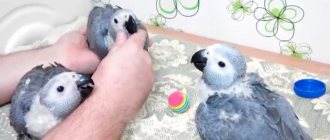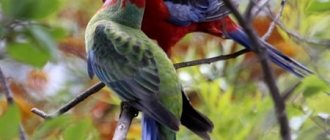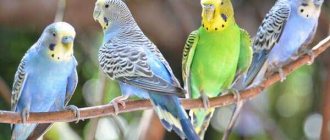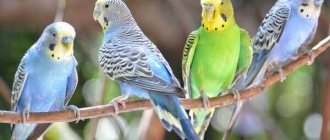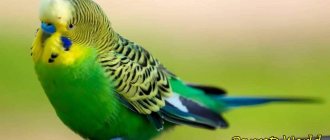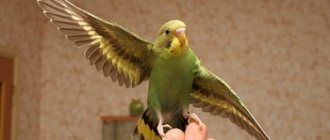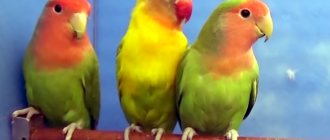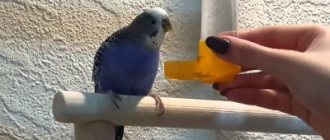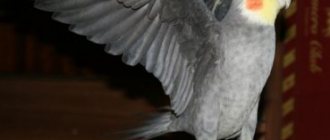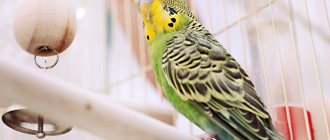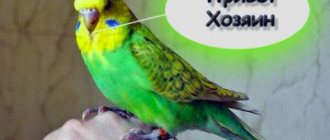Is there special music for parrots? This is not the most common question that owners of decorative birds may ask. The reaction of birds to audio recordings is unpredictable: each individual behaves differently from case to case. Today he can dance, tomorrow he will start singing along, or even scream and express dissatisfaction. Why does a parrot have a desire to dance, what melodies does he like best? There is not a lot of information on this topic, but there is still something to talk about.
Rhythmic music to which your parrot will dance with pleasure:
Do birds like melodies and songs?
Birds in the wild use different sounds to search for a partner, notify the flock of predators, or communicate with each other.
They use not only individual sounds, but also full-fledged songs. Therefore, different melodies evoke positive emotions in them.
If you play different songs for the wavy, you can see how they begin to sing, dance or even kiss with their mirror image or couple.
On the Internet you can find special selections for free that almost all birds like. They include a pleasant melody, chirping, soft voice, chirping and singing.
What compositions are chosen?
When choosing music for a wavy, rhythm and dynamics are taken into account. Birds are not experts, so they may like a completely unusual song. Even whistling evokes pleasant emotions in some individuals. Some birds prefer to listen to classical music, while others like dance tunes.
Statistics show that birds have a positive attitude towards music with words, so ordinary electronic tracks are sometimes ignored. If you turn on monotonous music at all, the bird may become depressed or begin to behave aggressively.
This behavior is due to the fact that the brain of parrots is more complex than that of other birds. They can perform complex cognitive tasks, so they can concentrate, perform dance moves, and are also distinguished by developed thinking.
Does your parrot like to listen to music?
YesNo
Usually birds do not concentrate on only one musical style, therefore they are considered music lovers:
- they have a positive attitude towards dance music, so they dance and chirp in unusual ways;
- parrots respond well to hip-hop, and some individuals are also fans of chanson;
- aggressive music, such as synth-pop, can cause stress in the bird;
- It is not recommended to play rock music loudly in the room where the bird lives, since even some people cannot quietly listen to such music;
- Electronic or club music without words can cause aggression.
Therefore, it is recommended to choose music wisely so as not to spoil your pet’s mood.
How to make a parrot say "Hello"
Step 1: Say it often. The main secret: repeating the same word many times. You need to say the word as clearly and often as possible while near the bird. The more times he hears a word, the more likely he is to remember it. This is why some parrots can surprise guests with profanity. When you pass the cage, stop for a moment to say, “Hello . Even if he doesn’t answer you, then you have laid this word in his memory - you have put a “brick” into the first stage.
Step 2. One-on-one. Of course, it may take a little longer than you planned: “Moscow was not built right away.” Try to allocate 15-20 minutes every day during the lesson for individual training in birds. Move him to an area that is unfamiliar to him (for example, to another room).
Say the word slowly so that the parrot understands what you are saying to it. After talking to him for a while, give him a chance to respond. Keep repeating this day after day, and your bird will say “Hello” to you when you least expect it!
Watch the wavy boy say “Hello”:
Step 3. Reward. When the bird says the cherished word, be sure to encourage it. Positive reinforcement – long term into future lessons: it will be one of the most valuable tools in learning. Immediately after the first: “Hello” from the bird, treat him with a tasty treat, praise him, show him how good he is! Treats pieces of apple, banana, pear, carrot or celery are suitable rewards for most parrots peanuts _ Keep treats on hand and within easy reach.
The wavy girls are dancing
Parrots have an amazing sense of rhythm. Therefore, they not only dance, but sometimes sing along with the performer. It is almost impossible to explain this behavior, but ornithologists believe that the wavy birds simply imitate the owner, so they begin to move unusually, repeating the movements of a person.
During the dance, the bird looks cheerful and contented , and also does not react to external stimuli. She actively moves her head, moves her paws, and can also raise and lower her wings. Such movements are performed even in the absence of treats. We invite you to watch a funny video where a parrot dances:
Video "Performance"
However, parrots are capable of more than just dancing to music. They learned to reproduce it, as the video clearly demonstrates.
Sorry, there are no surveys available at this time.
Was this article helpful?
Thank you for your opinion!
The article was useful. Please share the information with your friends.
Yes (87.50%)
No (12.50%)
X
Please write what is wrong and leave recommendations on the article
Cancel reply
Rate the benefit of the article: Rate the author ( 10 votes, average: 4.90 out of 5)
Discuss the article:
Innate characteristics
Scientists have found that wavy animals have an amazing sense of rhythm. Therefore, as soon as a person turns on the music, the parrots begin to sing and dance. They react this way not only to songs, but also to trills, chirps, chirps, long conversations or human singing. Such sounds amuse the bird, and due to the high spirits, it begins to dance.
At such moments it is very interesting to watch the bird, as it becomes incredibly cute and funny. But there are some individuals that do not respond to music at all.
It is also useful to read: Caring for a budgie
When the parrot speaks
On average, parrots begin to speak very well (subject to regular training) from 3 months to a year from the start of training. Of course, this depends on her ability to learn conversation, her character, ability and desire to speak. Your vocabulary will gradually expand if you continue to spend enough time with your pet.
Remember that when a parrot starts talking , it quickly begin to remember and repeat everything that it periodically hears, incl. and conversations between household members, swearing among themselves, or even constantly calling the cat for dinner. All this will be repeated without hesitation!
Imitation
Each wavy has its own unique characteristics, so birds react to the same music in a special way. Bird observations show that it is usually house wavy birds that respond to music by dancing and chirping. This is due to the fact that they live with people for a long time, so they imitate human behavior.
People begin to move, wave their arms and crouch during rhythmic and dance music. Parrots observe this behavior, so over time they begin to imitate humans. Copying the movements of the owner, they begin their own unique dance. After all, it is the wavy birds that are represented by amazing birds that copy human speech and behavior.
But not only imitation is the main reason for dancing, since music is an integral part of their life. Their entire existence is filled with sounds, chirping and singing. Birds enjoy pleasant melodies. On the Internet you can find many videos where wavy birds dance beautifully and rejoice in songs.
Review of Computer Methods for Android
1. “Phrasebook for parrots.” For free.
The program is distributed free of charge. There are several levels of difficulty. List of words to remember: Hello. Birdie. Wonderful person. Hen. I love. Guard. Be healthy. I love you.
The program automatically repeats the word every few seconds. It is best to use the program in half-hour sessions to obtain effective results.
2. “Conversational genre for parrots.” Paid.
You can use the program to teach birds words, phrases, and various sounds. You can install and use the program on a desktop computer or laptop. Along with the program, you acquire a basic set of words and phrases that are best suited for first training. It is best to use the program periodically, several times a day for 5-8 minutes.
3. "Training Cockatiel." Free. In English.
Do you want your parrot to learn to say your favorite phrase? The program provides the opportunity to record and use custom sounds recorded through the voice recorder application during training.
4. “Dictaphone.” For free.
There is nothing easier than recording or speaking words into a voice recorder or recording phrases into mp3, which the bird will teach instead of you. One of the disadvantages is the lack of communication with the bird, but trust is an important component of successful training!
5. Methods that can be found on YouTube. For example, watch a video on how to teach a parrot to talk. You can simply play this video for your pet when you leave home:
Which is preferable: melodies or songs?
It is impossible to say exactly what kind of music birds prefer. Some prefer regular melodies, while others respond exclusively to music with lyrics.
Therefore, the owner of the wavy must conduct his own experiment to find out the wishes of his pet.
Birds usually respond best to music with words. If electronic recordings are selected and listened to in clubs, they often cause aggression and discontent among birds.
Birds do not like computer processing, so such sounds lead to the fact that the parrot becomes uncontrollable. He begins to make noise and flap his wings, and his ability to learn speech deteriorates.
If you often play the same song to the bird, then over time the wavy will learn the words and hum the song at any convenient moment, so by listening to music you can expand the bird’s vocabulary.
An express method for learning your name in 5 minutes a day
The best way to quickly teach your bird to say its name is to include it in a sentence that it already knows. Once the bird has passed the first step and learned to say words, start adding its name to the word.
For example: “I love you, Polly,” or “Hello, Polly” if she already knows the word “Hello.” Repeat this phrase often throughout the day and during activities. 2 sessions a day for 5-10 minutes at a time are much more effective than longer sessions once every few days. The bird will forget what you are trying to teach it if you are not consistent. In just a few days, there is a chance you will hear the name from your pet’s beak!
Experiments
English zoologists decided to conduct an experiment to understand what kind of music parrots prefer. For this purpose, representatives of the smartest breed - Grays - were involved. The three birds were played music in different styles. It turned out that birds like rhythmic music the most. Classical melodies had a calming effect.
During the study, a special screen was placed in front of the parrots, on which there were two buttons. Using the first button, the birds could turn on rhythmic music, and when they pressed the second, a quiet and calm melody began to play. The parrots sang and danced to different songs with pleasure, so it was not possible to find out exactly which type of music they liked the most.
Ornithologists from Indiana conducted their own experiment with the parrot Snowball. Scientists have made several videos that have attracted the interest of psychologists and neurophysiologists. The bird was played different songs, while listening to which the bird made approximately 14 simple movements, as well as 2 complex ones. For each composition, he chose the most suitable actions to the rhythm. He used different movements for each song.
Melodies for developing speech skills
Music can be used not only to entertain a parrot, as it can speed up the process of learning human speech. The main rule is to practice regularly with birds.
To effectively use melody when training your pet, it is advisable to use simple tips:
- the optimal time for regular exercise is selected, and the ideal choice is the period in the morning before feeding, since with the help of treats you can easily reward your pet;
- classes are held in a calm and peaceful atmosphere, so the bird is not allowed to worry or worry about its safety;
- while talking and singing, you should not shout, get angry or raise your voice, as such activities do not bring positive emotions to the bird;
- when listening to music and talking, you need to hold the wavy on your hand;
- it is important to monitor your speech so as not to say unnecessary words;
- it is advisable to play the same song or verse every day so that the bird can quickly learn the desired passage;
- wavy students are considered attentive students, so they can remember even words spoken by chance, so you need to stick to the plan;
- It is advisable to use recordings in the absence of a stable Internet connection for online listening.
Only if there is a positive attitude, the wavy quickly learns to speak, so you need to praise and encourage your pet for successes with goodies.
During training, you can find out what kind of music the bird likes . The wavy learns its favorite songs very quickly, so the correct choice of composition has a positive effect on learning results.
Why do parrots talk
The speech apparatus of birds is similar to that of humans. Their lower larynx performs the same function as our vocal cords. Birds, accepting a person into their “flock”, try to match him as much as possible and reproduce similar sounds.
The frequency of a parrot's voice is more similar to a woman's, so sometimes a parrot can imitate a man's speech in a rather punning way. By the way, some pets may try to remember words because they know that in this case a person will pay attention to them. Surely, the parrot values attention to his person above all else . This is a great tool in the hands of those who want to understand how to train a parrot to speak the fastest.
